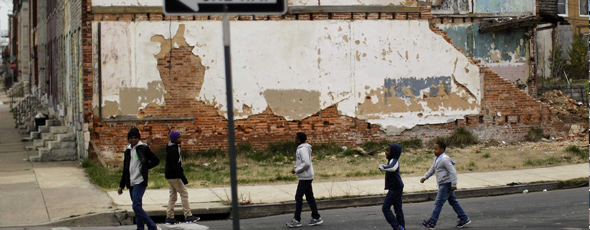
The demand for “the right to the city” addresses the state in two ways. Firstly, it appeals to the state to grant or uphold a right. Secondly, it is concerned with the privatisation of public spaces or housing i.e., places within the state’s domain. These provide reason enough to ask what the relationship is between the state – be it in the form of the national government or in the form of the local council – and people that have to, but cannot, make their rents.
A prevailing idea on this relationship, among activists, is that once upon a time city authorities mitigated social suffering with policies such as building social housing. Then, it seems, the city did something for ordinary people, tenants or the poor. Many critics examine these past activities skeptically, asking whether capital got too good a deal nonetheless. Still, here the city is said to have or had a balancing effect, acting for everyone somehow. Today, on the contrary, poor people are – so the idea goes – ‘let down’; the doors left wide open to capital. Critics accuse the local councils or the Mayor of London of one-sided attention to capital (or put more crudely, the wealthy). The state or the city used to have a neutral, balancing effect, but those times are long gone in the “neoliberal” era.
However, an error here lies in the mistaken assumption about the city’s starting point: the reason why it sometimes puts limits on the pursuit of capitalist interests and ‘helps the poor’. The starting point was never that of a city confronted with two opposing interests, simply and only seeking to limit both somewhere in the middle. Rather, local authorities always have, and are, pursuing their own ends. These often align with business interests, but they can also stand in contrast.
For example, on the one hand, the state acknowledges the right of landlords to utilise their properties as a means to make money. They get to ask whatever rent they can get away with. On the other hand, the council provides social housing; it offers cheap housing to those who cannot afford private sector rents. While this leaves the immediate interests of private landlords untouched, it deals with the problem that the economy needs a local workforce, a workforce which might not be able to afford rent in the areas they are needed.
The council attempts to ensure the availability of this workforce by means of social housing – poor people living in central London. Furthermore, if someone becomes unemployed that person should not fall through the cracks completely but be able to get back into a job, perhaps with the help of their social network. Hence, the council might give preference to local people when assigning flats.
Moreover, the state does not simply come across the characters of landlord and tenant, it creates them. Landed property as a source of income is something licensed exclusively by the state. The freedom to decide on the use of the land in question, to the exclusion of everyone else, begins with an entry in the land registry. The state records which parts of its territory fall under the authority of which private individual. In the same process the state creates the inverse figure, that of the tenant, who does not own land and must pay a tribute (rent) to the owners for its use.
Not only when the city promotes economic growth – say with “Tech City” initiatives – or when it privatises public spaces but already when it deals with the confrontation of tenants and landlords, it regards its territory as a means to make money. The local administration has its own interests and it relates to other existing interests on this basis, sometimes conceding more to them and sometimes less. The city is neither a neutral mediator nor simply dependent on money it does not earn itself but must be earned elsewhere. Instead, the state and the city make themselves dependent on a society in which everything revolves around the augmentation of money, and promote this principle. That is their intended political programme and for this programme the state grants and guarantees rights.
An additional, detailed account on the economy of the land and the role of politics in gentrification is available here.
By The Wine and Cheese Appreciation Society of Greater London | @portandcheddar









